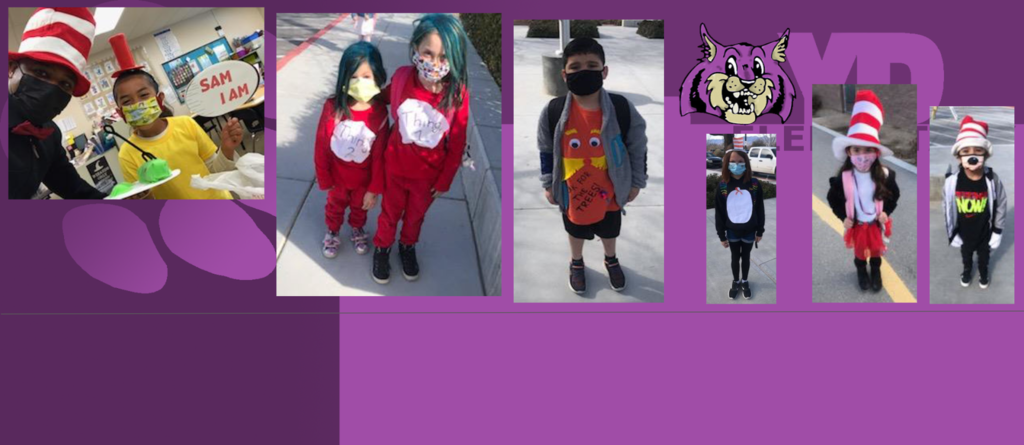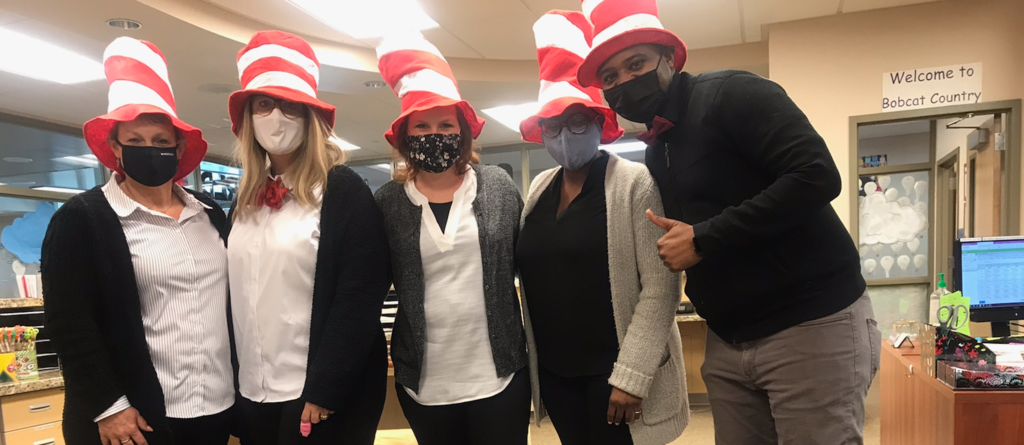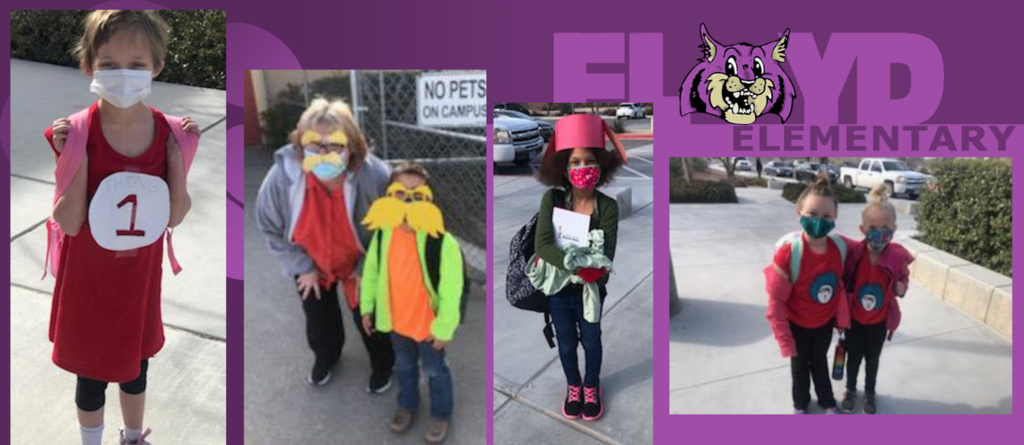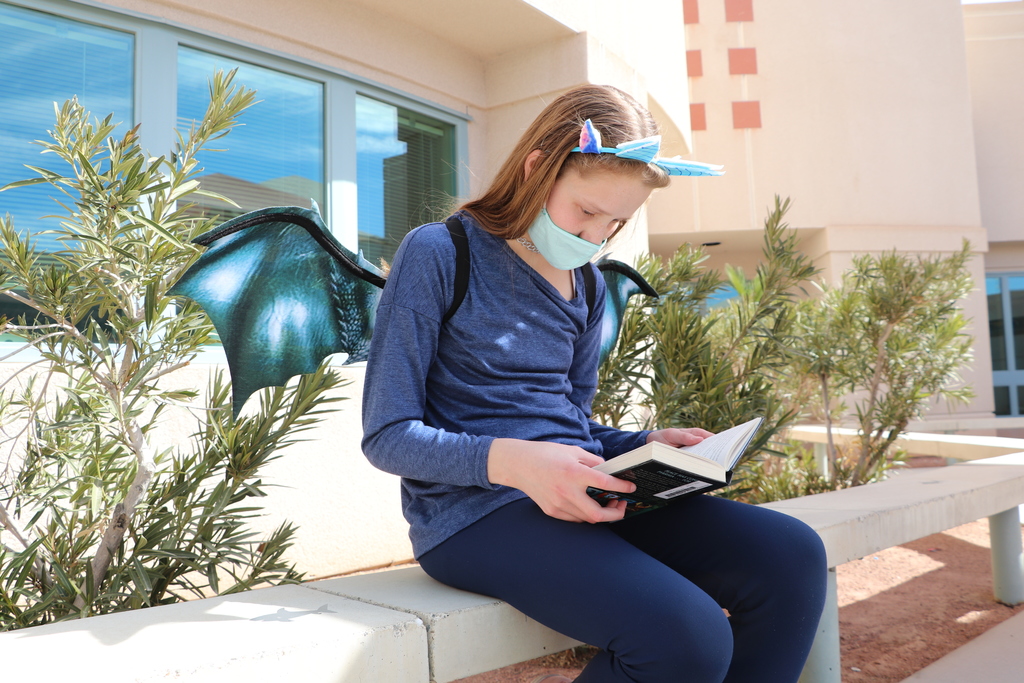The first week of March is always National Reading Week. Here are a few photos of schools getting into the spirit.




Monday, March 8, 2021
Be clear that missing school is not an option
Attendance matters, even in a pandemic. Participating in class, whether it is in-person or virtual, promotes learning (if your teen can't access her classes, let the school know). Show your teen that attendance is a priority: Expect her to attend every class unless she is sick. Avoid making appointments for her during school hours. And if she skips classes without permission, make it clear that she has broken an important rule at school and at home.
http://niswc.com/37cHC276091
____________________________________________________________
Friday, March 12, 2021
Strengthen connections with a shared journal
When teens have time to think about what they want to say, they sometimes share their deepest thoughts. Try sharing a journal with your teen. Glue a picture of the two of you on a notebook, then write something positive about her—how hard she's trying in school, how she makes you laugh—and leave it for her to read. The next day, it is her turn to write to you. Keep it up the rest of the month.
http://niswc.com/37cLC276091
Monday, March 8, 2021
Help your child learn to work as part of a team
__Leadership is a positive trait, but students also need to know how to work with others without taking over. To encourage compromise, take turns making some family decisions, such as what toppings to put on a pizza. Discuss the need to consider everyone's tastes. Promote fairness by setting rules such as "If one person chooses the game, the other gets the first turn." Praise your child when he shows teamwork.
http://niswc.com/17cHC276091
______________________________________________________________
Thursday, March 11, 2021
Talk about ways your child can handle anger
Feeling angry is normal. But children need to learn appropriate ways to express their anger. Teach your child coping strategies she can use when she feels angry, such as taking deep breaths. Encourage her to think for a minute before saying anything, or to get away from the situation until her feelings are under control. Give your child options for different situations: If she's being teased, for example, she can walk away or tell an adult.
http://niswc.com/17cKC276091
________________________________________________________
Use a log to see where all your time goes
Time is a precious resource. Is your family making the most of your time? To find out, set aside one week to have family members keep a time log. Every half hour, everyone should record how they spent their time. The time log will give you a clear picture of where each person's time is going. When you know that, you can make choices that are best for you, your teen and your family.
http://niswc.com/37cAC276091
Thursday, March 4, 2021
For Twitter/text message:
Provide positive alternatives to screen time - http://niswc.com/37cDC276091
For email/Facebook:
Provide positive alternatives to screen time
Everyone is spending more time with screens these days, for understandable reasons. But screens aren't the only way to learn. Here are some screen-free things to do with your teen that will help him think and learn: Design a new board game. Make a family meal. Have a family Karaoke Night. Take a walk in a new place. Take turns bringing a news article to dinner and discuss what each person thinks about it.
http://niswc.com/37cDC276091
Tuesday, February 23, 2021
For Twitter/text message:
Thinking like a teacher can improve test success - http://niswc.com/37bWC276091
For email/Facebook:
Thinking like a teacher can improve test success
There are many things your teen can do to prepare for a test. One useful way is to think like the teacher. After your student studies her notes, have her write down questions she thinks might be on the test. Then she should plan how to answer them. Chances are, some of her questions will show up on the test, and your teen will feel confident if she's thought through the answers ahead of time.
http://niswc.com/37bWC276091
Five things teachers really want from parents
Teamwork between home and school can make a big difference to your child's learning. Here are five things teachers wish all families would do: 1. Build your child's confidence with praise and love. 2. Discuss the school day and the things your child is learning with her. 3. Support your child's effort with schoolwork. 4. Schedule some relaxed reading time each evening. 5. Partner with the teachers to support your child.
http://niswc.com/17bbC276091
onday, February 15, 2021
For Twitter/text message:
College could make a million-dollar difference - http://niswc.com/37bOC276091
For email/Facebook:
College could make a million-dollar difference
Does your teen want to make millions of dollars? Earning a college degree makes that much more likely. Share these statistics with your teen: According to the U.S. Bureau of Labor Statistics, people with college degrees earn nearly $30,000 more on average per year than people who have only high school diplomas. Over a working lifetime, that difference adds up to more than a million dollars.
http://niswc.com/37bOC276091
Thursday, February 4, 2021
Move forward from a poor report card
How should you react to a poor report card? First, don't panic or get upset. Just ask your child calmly about each grade. Does she understand why she received it? Next, ask the teacher about things your child needs to do to improve and ways you can help. Find out what help may be available from the school, such as peer tutoring. Then help your child develop specific, achievable goals for improvement.
http://niswc.com/17bDC276091
Saturday, February 6, 2021
Ask your teen to publish a family newsletter
Has it been a long time since your family has seen relatives? Your teen can keep everyone updated on family activities and improve his writing skills at the same time by putting together a family newsletter. Have him write to relatives asking for news, stories and photos. Then he can compile them and send his newsletter out. He'll gain writing, editing and layout skills, and the joy of keeping the family connected.
http://niswc.com/37bFC276091
Pahrump Snow Day Update for Employees, 7:50 AM
Custodians, Secretaries, and Administrators are to report to work.
Teachers and support staff stay home.
Tues, January 26, 2021 - Pahrump Schools:
A snow day has been called for students in Pahrump. Students in Pahrump will not have school today.
At this time, school will proceed normally for students in other communities.
Employees in Pahrump are asked to report to work if the roads from their home look clear. Communicate with supervisors if you cannot report.

Saturday, January 30, 2021
Suggest activities to promote writing
Strong writing skills help teens in almost every subject in school. Help your teen find engaging ways to practice. He might enjoy writing stories for a younger sibling, writing captions for family photos, writing letters to request free samples or materials, or keeping a journal. These activities are meant to be fun. If your teen isn't interested, keep providing chances to write until one appeals to him.
http://niswc.com/37adC276091
__________________________________________________________
Friday, January 29, 2021
Three preparation strategies lead to better essays
Your teen will face many essay tests and timed writing assignments in her school career. Share these tips for success on them: 1. Do the research. Your teen may not know the essay topic, but she can identify several examples from the material that could apply to a variety of themes. 2. Make an outline. Opening paragraph, two to three examples and a conclusion. 3. Memorize a quote or two that could be useful in different contexts.
http://niswc.com/37acC276091
Wednesday, January 27, 2021
Create silly sentences to make facts memorable
Studying for a test usually involves memorizing. Your child can remember lists of items by writing a sentence using words that begin with the first letter of each word in the list. For example, the first letter of each word in "My Very Educated Mother Just Served Us Noodles" stands for the first letters of the planets: Mercury, Venus, Earth, Mars, Jupiter, Saturn, Uranus and Neptune.
http://niswc.com/17aaC276091
_____________________________________________________________
Thursday, January 28, 2021
One activity will help your child every day -
One of the most important things you can do to help your child succeed in school is to read aloud together. It introduces young children to the world of books, and even older kids love to be read to. Make reading aloud together a daily priority. To keep it interesting, be sure to read books you enjoy. And sometimes, build your child's vocabulary by reading books that are a little too hard for him to read alone.
http://niswc.com/17abC276091
Let experience reinforce lessons in self-discipline
When teens think of discipline, they often think of parents and teachers correcting misbehavior. But the most effective kind of discipline is actually self-discipline. To encourage it, give your teen a say in setting his own study schedule. Then let him experience the consequences of his actions. If he puts off doing a project, don't help him do it at the last minute.
http://niswc.com/37aXC276091
____________________________________________________________
Challenge your teen to argue in writing
It's important for students to consider the different sides of an argument before taking a side. To provide practice, challenge your teen to write a persuasive letter to an elected official expressing an opinion on a topic. Your teen will need to research the topic in order to explain why one viewpoint makes more sense than the others. It's a real-world way to build thinking and writing skills.
http://niswc.com/37aWC276091
Honor Dr. King by teaching respect for others
As you celebrate Martin Luther King, Jr. Day, talk with your child about the importance of treating people with respect. It's the basis for other desirable behaviors. Common courtesies, like saying "Thank you" and "Excuse me" are done out of respect. Trying to understand other people's viewpoints and differences is another respectful courtesy, as is being honest and not deceiving, cheating or stealing from others.
http://niswc.com/17aRC276091
__________________________________________________________
Create a newspaper your child will love
Newspapers aren't typically something young children choose to read. To engage your child, try making a newspaper based on his interests. Collect articles about his hobbies, school and neighborhood. Glue the articles to pages from a real newspaper, and give him his own "edition" to read while you read the rest of the paper. Then discuss articles you each find interesting.
http://niswc.com/17aWC276091
eRate, Category 2 - 470 RFP - January 2021
View Here: https://5il.co/oggq
Discuss violence prevention with your teen
Preventing conflict and violence is a top priority for schools. And families play a key part. Talking to your teen on a regular basis is an essential first step. To begin a family dialogue about violence and safety, ask questions such as, "What makes you feel safe?" or "What are ways to solve a problem without hurting anyone?" Listen carefully to your teen's answers. Make it clear that you take this issue seriously.
http://niswc.com/37aQC276091
Encourage scientific thinking with a 'laundry lab'
Doing laundry can be more than just a chore. It can also teach your child science skills, such as observing and classifying. Scientists notice details. Ask your child, "Does this towel feel different from that one? Why could that be?" Scientists also put things in groups. Help your child sort the laundry by color, size or family member. Challenge her to come up with a new way to "classify" clothes.
http://niswc.com/17aQC276091
Help your teen make the most of winter break
Your teen may be looking forward to relaxing over winter break. But staying on a regular schedule will make returning to a school schedule in January easier. Encourage your teen to limit sleeping in to one hour past his normal wake up time. Then have him schedule some time each day for reading, studying, writing and creating.
http://niswc.com/36lPC276091
Listen to your child…and to the teacher
It's important for children to feel heard and believed. If your child tells you something the teacher did that seems unkind or unfair, you should listen. But don't assume the incident is as bad as it sounds. If you are concerned by what your child says, contact the teacher. Calmly express your concern and ask for the teacher's point of view. If there's a problem, work together to solve it.
http://niswc.com/16lOC276091
